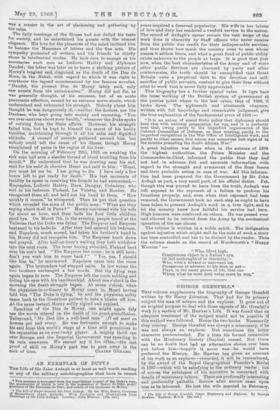AN EXIlfPLAR Or MITY•t THE Life of Sir John Ardagh
is at least as well worth reading as any of the military autobiographies that have in recent • This account IP borrowed from the unpublished jourpal of the Duks's The manuscript of which in now In the poesession of Baron de Behr, great. grandson of the Duchess, do Dino, and cousin of tho Duthesse Morny.
f The Life of Dfajor-Gonoral Sir John Ardagh. By his Wife, Susan, Conntens of 7dalmeehttry (Lady Ardngli). WIth Bortrnita and Illuskalions from Drawings by 8ir John Ardagh. London: John Murrny. [15s. tict.J years acquired a deserved popularity. His wife in her labour Of love and duty has rendered a twofold service to the nation. The record of Ardagh's career reveals the vast scope of the work done in obscurity by Staff officers who never receive •
from the public due credit for their indispensable services, and thus shows how much the country owes to men whose names it seldom hears, and what a great fund of public utility exists unknown to the people at large. It is good that just now, when the best characteristics of the Army and of some other public Services are obscured by party and other controversies, the truth should be exemplified thet Great Britain owes a perpetual debt to the devotion and self- sacrifice of public servants, content to give their lives without stint to work that is never fully appreciated.
This biography has a further special value. It lays hare' the inner working of the British system of government it the precise point where in the last crisis, that of 1899, it broke down. The eighteenth and nineteenth chapters, written with full knowledge and remarkable judgment, give the true explanation of the fundamental error of 1899 :—
"It is an axiom of sound State policy that diplomacy should. keep stop with national preparation for war, and it is perfectly true that, owing partly to the imperfect organisation of the Cabinet Committee of Defence, as then existing, partly to the imperfect recognition in the War Office of intelligence work, and partly to other causes, this axiom was somewhat lost sight of hit the months preceding the South African War."
A great injustice was done when in the autumn of 1899 the highest authorities, the Prime Minister and the Commander-in-Chief, informed the public that they bad not had in advance full and accurate information with regard to the strength and armament of the Boer forces and their probable action in case of war. All this informa- tion had been prepared for the Government by Sir John Ardagh as part, a very small part, of his official duties. Yet, though this was proved to have been the truth, Ardagh was left exposed to the reproach of a failure to perform his functions properly, and, oven when that reproach had been removed, the Government took no such step as ought to ha.ve
been taken to present Ardagh's work in a true light, and to let the country know how faithful his service had beep.
High honours were conferred on others. He was passed over
and allowed to be retired from the Army by the mechanical operation of the age clause.
The volume is written in a noble spirit. The indignation against injustice which might well he the note of such a story has been controlled, and has to be divined by the reader. Tbus the volume atrial& as the record of Wordsworth's "Happy Warrior ' "Who, lifted high, Conspicuous object in a Nation's eye, Cr left unthought-of in obsciirity,— Who, with a toward or untoward lot, Prosperous or adverse, to his wish or not— Plays, in tho many games of life, that one Where what he moat cloth value must be wen"






































 Previous page
Previous page